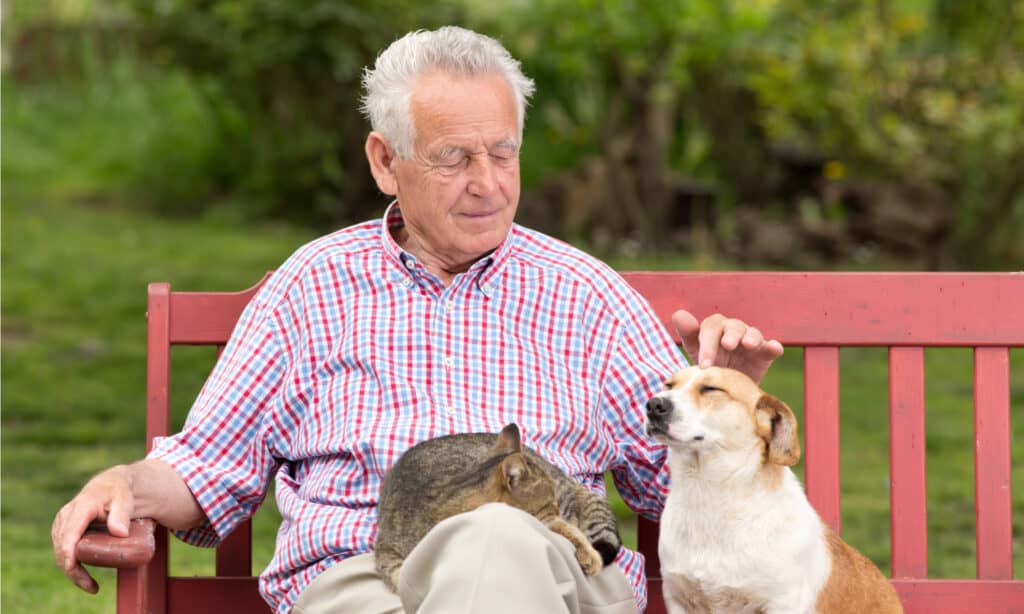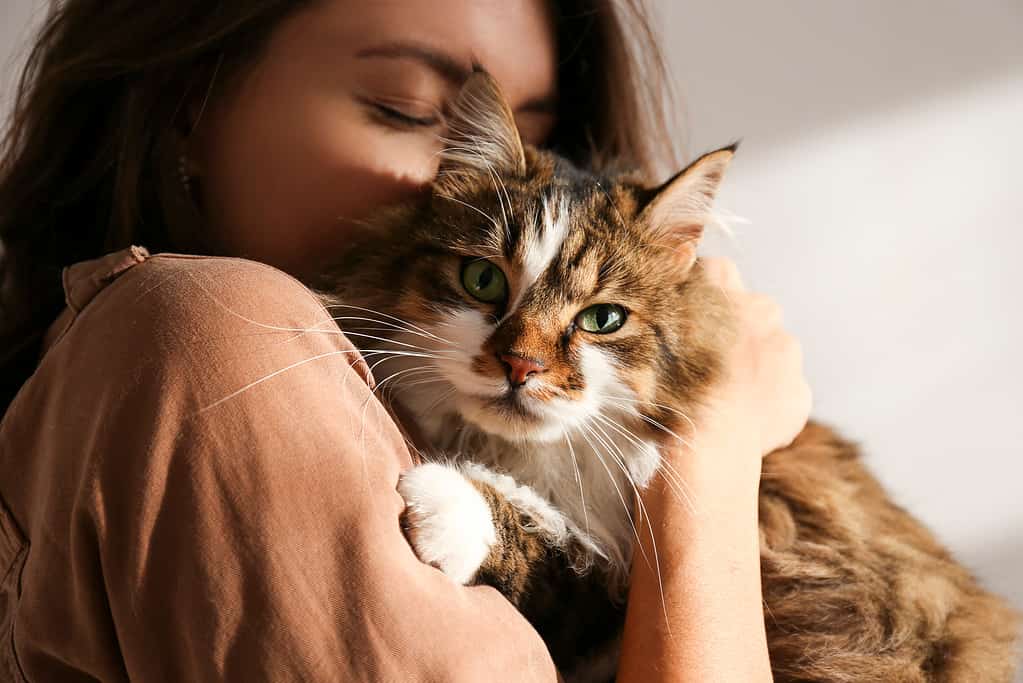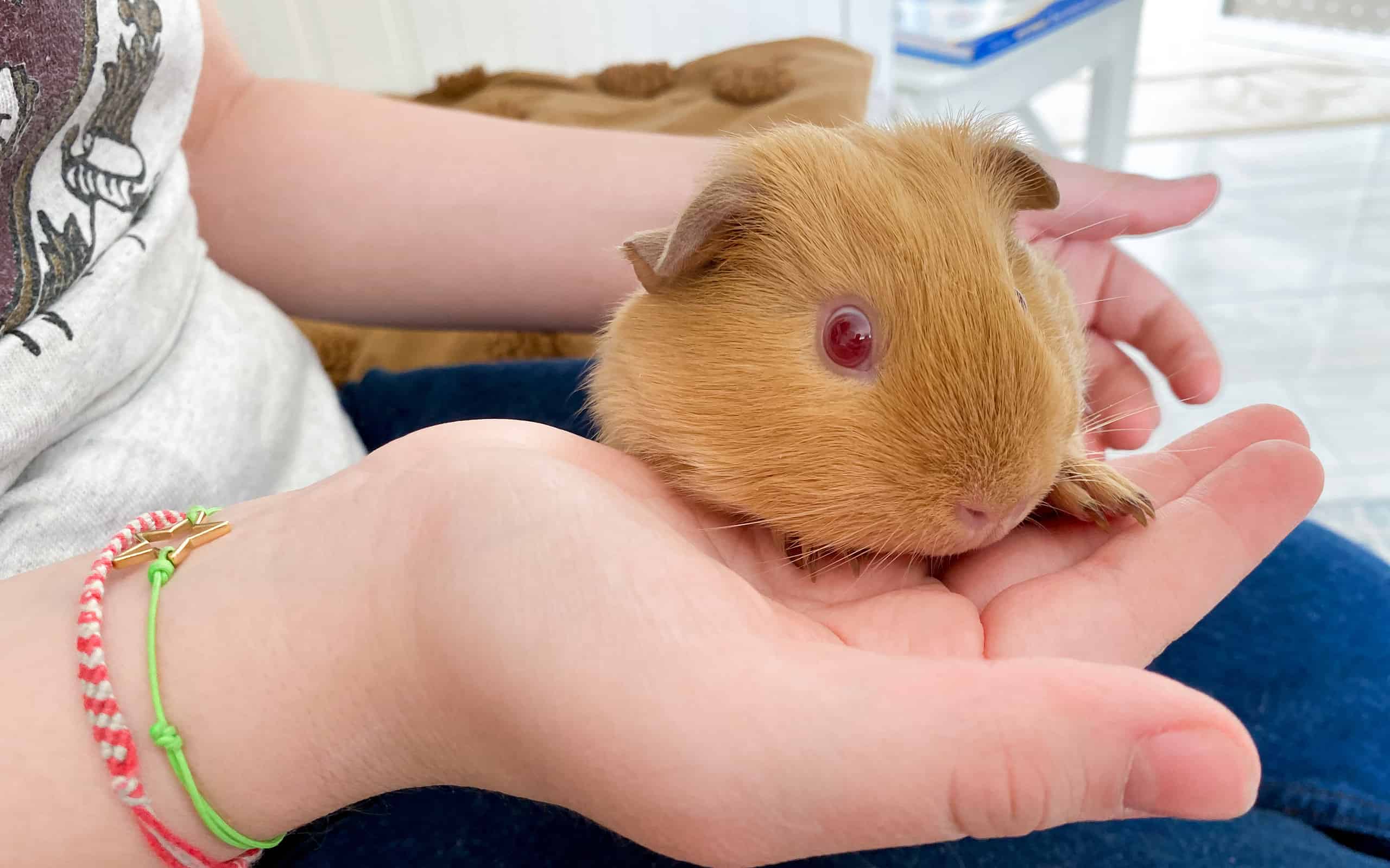
According to research, the term pet parent accurately describes and reflects the way we bond with our companion animals.
©Budimir Jevtic/Shutterstock.com
You may be surprised to know that the term pet parent is somewhat controversial. Although it sounds innocent enough – especially to those of us who proudly refer to ourselves as our pets‘ moms and dads – this phrase sends skeptics into a tizzy. Why? Critics worry that self-proclaimed pet parents are essentially incapable of discerning the difference between people and animals. Online forums and blogs, for example, have gone so far as to label us “cringy AF” – insisting that we live in a simulation in which we have confused our dogs (and likely other pets) for living dolls, and suggesting that we are highly susceptible to emotional manipulation by predatory companies intent on tugging on our heart strings simply to sell us products.
But are they right? Do those of us with fur babies desperately need a reality check or a wake-up call? Have we have lost our ever-loving dog-gone minds? Are we weirdly obsessed? Or experiencing a collective hallucination?
Not according to science.
In truth, empirical evidence supports the notion that we are “parenting” our canine, feline, equine, porcine – or any other “ine” kids.
Here’s how…
No, We Don’t Think Our Pets are Human
First, let’s address the proverbial elephant in the room, to use an animal pun. No one in their right mind believes that human children are exactly the same as our furry or feathered ones. If anything, most pet parents have a pretty firm grasp on the fact that we are not the same species as the animals with whom we share our homes and lives. We understand perfectly well that our dogs, cats, bunnies, hamsters, and other beloved animals have totally different needs, perceptions, communication styles, and ways of being in the world than people do. If anything, we appreciate and marvel at these differences. I mean, who isn’t in awe of their dogs’ astonishing sense of smell or their cats’ mind-blowing agility?
That said, humans do have a tendency to anthropomorphize their pets by falsely assigning them human characteristics. Viewing animal behavior through a strictly human lens leaves a lot of room for misinterpretation and can be quite harmful. Dr. Andrea Horowitz, for example, rightfully takes issue with the many ways we falsely attribute our pets’ actions or responses to uniquely human emotions.
As a case in point, if our dogs poop or urinate on the floor during house-training – we might misinterpret this behavior as an expression of malice or revenge for leaving them home alone. People too often believe their dogs are trying to punish them, when in reality, they are likely experiencing fear, confusion, or frustration. Similarly, people label cats spiteful for urinating outside of the litter box, rather than seeing this as a sign that a cat is sick or in pain.
However, even without anthropomorphizing our pets at all – which is something to be aware of and to avoid – science has revealed that we bond with our pets in ways that mimic human infant-parent relationships.
Dogs Light Up Our Brains

According to science, we are, in fact, parenting our pets.
©PeopleImages.com – Yuri A/Shutterstock.com
Do you ever feel like you could stare into your dogs’ eyes all day? As it turns out, there is a good reason why you feel that way. See, dogs have worked very hard to become our kids. For millennia, as researchers have shown, they have co-opted the very mechanisms within our brains responsible for forging our most profound social connections. One of their best tricks – gazing into our eyes – helps us form an intimacy that mirrors the way that human infants bond with their mothers.
In fact, mutually gazing into our beloved canines’ eyes triggers an identical hormonal reaction to the one we experience with newborns – releasing high levels of oxytocin on both sides. Often called the love hormone, oxytocin is nature’s way of facilitating childbirth while helping us form strong social attachments. Our bodies also release this powerful hormone into the bloodstream whenever we listen to music, exercise, or engage in touch. Oxytocin helps us feel relaxed and satisfied.
For both men and women, the human-canine exchange of this feel-good hormone replicates and reflects the love we develop with our human children. How cool is that?
Moreover, brain-imaging studies have further revealed how the human amygdala, medial orbitofrontal cortex, and dorsal putamen light up equally when we stare at either our dogs or our human kids. Both children and dogs literally make us glow inside.
Far from being passively domesticated, as many people once assumed, dogs have demonstrated significant agency in making us care for and love them during a long span of coevolution. And this whole parenting thing has long been a key part of the deal. An unspoken agreement. A pact for our packs.
Is it any wonder they have completely stolen our hearts?
Cats Treat Us Like Their Mothers

Cats meow only to humans, and not to other cats. This form of communication mimics the cries of human infants.
©evrymmnt/Shutterstock.com
According to John Bradshaw, author of Cat Sense: How the New Feline Science Can Make You a Better Friend to Your Pet (2014), cats perceive us as fellow felines and often interact with us in a manner reminiscent of their interactions with their biological mothers. One compelling example is the cat’s meow, so to speak – since this vocalization communicates various emotions specifically to humans. More importantly, meows imitate a human baby crying- appealing to our deepest instincts to nurture and love.
So like dogs, cats have tapped into our innate ability to form profound attachments.
We are Meant to Love Animals Like We Do Our Children
Human brains are already hardwired to take care of young individuals who are not our own biological offspring – which is something that makes us a bit of an anomaly in the animal kingdom. Researchers like evolutionary anthropologist Sarah Hrdy have revealed that we have genetic coding to raise babies who are not our own. So it is in our DNA to love animals as our children. There is even an entire fancy concept for all of this: alloparenting.
In short, according to science, dogs, cats, and likely other animals, have chosen us to be their moms and dads. And we have chosen to love them as our children.
So P. S….the term pet parenting is totally legit and it is here to (sit) and stay.
Bam.
Now that we have settled the matter – and we understand, beyond a shadow of a doubt that we are parenting our pets – let’s take a moment to appreciate the magnificence of the human-animal bond.
And while more research has been done on how we communicate and connect with dogs and cats than on many other animals, I suspect we will continue to learn more and more about how we connect deeply with all types of different species in the near future.
Thank you for reading! Have some feedback for us? Contact the AZ Animals editorial team.








